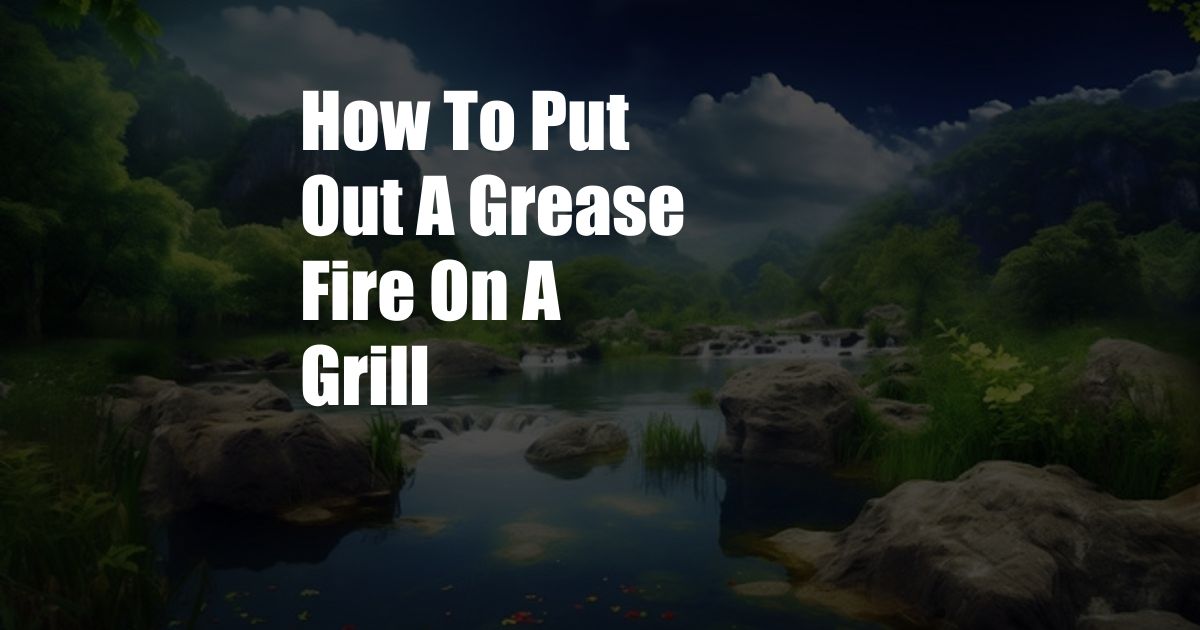
How to Put Out a Grease Fire on a Grill: A Comprehensive Guide
We’ve all been there: you’re grilling a juicy steak or a pack of hot dogs and suddenly, flames burst from the grill like a volcanic eruption. Grease fires can be terrifying, but knowing how to extinguish them swiftly and effectively is crucial. In this article, we’ll delve into the intricacies of grease fires and provide you with a comprehensive guide to put them out safely and efficiently.
The Science Behind Grease Fires
Grease fires occur when cooking oils or fats ignite due to excessive heat. They differ from other fires because they release flammable vapors that can spread rapidly, making them notoriously tricky to extinguish. Understanding the science behind grease fires is the first step towards effective firefighting.
When cooking oil becomes hot enough, it reaches its “smoke point,” where it begins to break down and release volatile vapors. As the temperature rises further, these vapors ignite, forming a fierce flame. The flame’s intensity is influenced by several factors, including the type of oil, the amount of oil, and the presence of other combustible materials.
Extinguishing a Grease Fire
When faced with a grease fire, the immediate instinct is often to douse it with water, but this is a major NO-NO. Water reacts violently with grease, causing it to splatter and intensify the fire. Instead, follow these steps to extinguish the blaze safely:
- Turn off the heat source: Immediately turn off the grill or stove to stop the fire from spreading.
- Smother the flames: Use a fire extinguisher specifically designed for grease fires, such as a dry chemical or a Class B extinguisher. Alternatively, slide a lid or a baking sheet over the grill or pan to suffocate the flames.
- Cover the area: If you don’t have an extinguisher or a lid, cover the grill or pan with a thick cloth or blanket to deprive the fire of oxygen. However, NEVER use a towel or paper towels, as they can easily catch fire.
- Leave the area: If the fire is too large or out of control, evacuate the area immediately and call the fire department.
- Monitor and clean up: Once the fire is extinguished, monitor the area for any lingering flames or heat. Allow the grill or pan to cool completely before cleaning up the grease and debris.
Tips and Expert Advice
Beyond the basic steps, here are some additional tips and expert advice to help you prevent and extinguish grease fires:
- Clean your grill regularly: Remove excess grease and food residue from your grill after each use to reduce the risk of a fire.
- Avoid overloading the grill: Overcrowding the grill with too much food can trap grease and increase the chances of a flare-up.
- Use a grill brush: Regularly brushing your grill grates will remove any remaining food or grease.
- Keep a fire extinguisher nearby: Have a Class B fire extinguisher within reach of your grill or stove at all times.
- Never leave cooking unattended: Always stay present when grilling or cooking, especially when using high heat.
FAQs
Q: Can I use baking soda to put out a grease fire?
A: While baking soda can effectively extinguish small kitchen fires, it’s not recommended for grease fires. Baking soda can react with the grease, creating a foam that can spread the fire.
Q: Is it okay to use a wet towel to cover a grease fire?
A: Never use a wet towel or paper towels to smother a grease fire. The water can cause the oil to splatter, intensifying the fire, and the towels can easily ignite.
Q: Can I use sugar to put out a grease fire?
A: Sugar is not an effective extinguishing agent for grease fires. It can caramelize and feed the fire, making it even more dangerous.
Q: What should I do if a grease fire occurs inside my home?
A: If a grease fire erupts indoors, evacuate the area immediately and call 911. NEVER attempt to extinguish the fire yourself unless you have the proper training and equipment.
Conclusion
Grease fires can be both frightening and dangerous, but by understanding their science and following proper extinguishing techniques, you can effectively control and prevent them. Remember, the key is to act quickly, stay calm, and prioritize safety. By adhering to the guidelines outlined in this guide, you’ll be equipped to handle a grease fire with confidence and minimize the risk of injury or damage.
Are you interested in learning more about fire safety and cooking techniques? Explore our blog for a wealth of informative articles and expert advice to enhance your culinary skills and keep your home safe.